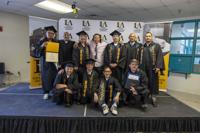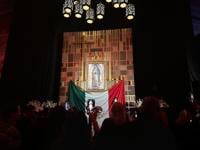
Rahman Khan, Group Vice President, Community Impact of Spectrum, presenting the $30,000 Spectrum Digital Education Grant check. Photo by Brenda Verano.
An upgraded computer lab seeks to close the digital divide gap disproportionally affecting Latinos in Los Angeles.
The lab is the product of a digital equity partnership between the Hispanic Federation,Central City Neighborhood Partners (CCNP) and Charter Spectrum.
In L.A. County, it is estimated that approximately 365,000 households lack broadband internet service, especially among lower-income communities and among populations that are predominantly Black and Latino.
On Thursday morning, Spectrum presented a $30,000 Spectrum Digital Education Grant to support a bilingual technology center within CCNP, a non-profit community center located in Westlake that for almost 25 years, has helped advance systemic change for low-income families.
For the community, CCNP has been a one-stop service place that provides community members with housing, food, health, transportation and education services, as well as financial education, free tax preparation, academic support, youth leadership, civic engagement and youth workforce development.
Although the center already has a computer lab, the Spectrum grant will replace old and outdated computers of more than 15 years with 18 new laptops, a digital board, a printer and fully equipped computer and digital skills training, giving the majority Latino community access to online resources and better job opportunities.
Margarita Alvarez, executive director of CCNP, said the new bilingual digital equity center will not only be a place for families to access internet connectivity, internet-enabled devices and digital literacy skills but also help people feel more connected. She told CALÒ News the digital divide among low-income Latinos and Black communities has always existed but became more apparent during the COVID-19 pandemic.
“We saw the divide, the digital divide, during the pandemic,” she said. “A lot of our families who were connected to the center weren't able to apply for some of the [COVID-19] benefits that they were eligible for because they didn't have access to computers or internet at their homes, and for some that did have internet access, many did not know how to access things like email. That’s when we found out that our families were left behind.”
Patricia Ortega, 45, who immigrated to the U.S. as a young adult and now lives in City Council District 1 and receives services at CCNP, said she is thrilled that the current computer lab at the center will be upgraded.
“I only ever attended elementary school,” she said. “I had the opportunity to continue studying and learning with the current lab that we have here. I learned Excel, PowerPoint and other programs. That’s why many of us come to the U.S., to better ourselves and to create more opportunities for us and our families, so for people like me, this will help us achieve those dreams.”
Ortega’s dream is to land a job where she can put the digital literacy knowledge she has obtained into practice and also be more prepared to help her kids with online homework. “I'm going to put this into my work, in new opportunities and future jobs,” she said. “We will be able to benefit from continuing to study, grow and help our children in their work since now everything is digital.“
Assemblymember Mark Gonzalez (D-Los Angeles), who took the oath of office earlier this week as California’s newest member of the state assembly, was also present at Thursday’s meeting where the funds were presented.
Gonzalez said the community needs the necessary information technology resources to participate in society, democracy and the economy fully.

Assemblymember Mark Gonzalez (D-Los Angeles). Photo by Brenda Fernanda Verano.
“Sixteen percent of folks in this neighborhood alone, the West Lake Pico Union of Los Angeles, do not have access to online technology,” he said. “Not everybody [in this district] here can afford the internet, nor can they afford the access to those computers. Most folks in this area spend 50 percent of their income on rent alone. Without access, our community does suffer, [and] this bilingual digital equity center will bridge that divide.”
The bilingual digital equity center will officially be inaugurated and open to the public in February 2025. The center is just one of several labs that the Hispanic Federation has opened in collaboration with Spectrum to better serve Latino communities across the country.
Brent Wilkes, senior vice president for the Hispanic Federation’s institutional development, said the digital equity centers, or computer labs, are part of the organization's digital equity and workforce development agenda.
Over 92% of U.S. jobs now require digital skills, but nearly a third of American workers, most notably Latinos, lack basic digital proficiency and have limited internet and computer access, according to a 2023 report from the National Skills Coalition and the Federal Reserve Bank of Atlantat.
Wilkes said that to address this disparity, the Hispanic Federation leads and supports several workforce development and digital skilling programs or initiatives, like the one at CNP, to empower Latinos with the 21st-century skills they need to succeed.
“The partnership with Charter Spectrum is part of the Hispanic Federation's National Digital Equity Campaign, and with the help of other partners, we have now created a network of 51 digital equity centers throughout the country,” Wilkes said. “[The centers] are providing vital digital skills training to the folks in their community. Folks that are in low-wage, part-time jobs and workers of color have been the most affected by unemployment due to the pandemic and we know that the economy has become increasingly focused on tech skills.”
Rahman Khan, group vice president, Community Impact of Spectrum, presented the $30,000 Spectrum Digital Education Grant check at Thursday’s meeting.
“Just this year, we have invested over $10 million in this work across the country. That is 66 different nonprofits that are doing this work, and I can tell you that the Spectrum Digital Education Grant is very competitive but when the Hispanic Federation submitted the application and told us about what CCNP was doing in L.A., we knew we had to support this work,” he said.
More than just being a place where people can receive digital literacy classes, Alvarez said that the new lab will also be a place where families can reserve a computer and use it at their own time; it will also help community members' college applications and be a safe place for people to print out their resume or cover letter, all at no cost.
“Our community deserves this,” she said.
For more information on CCNP and their services, please visit https://laccnp.org/.












(0) comments
Welcome to the discussion.
Log In
Keep it Clean. Please avoid obscene, vulgar, lewd, racist or sexually-oriented language.
PLEASE TURN OFF YOUR CAPS LOCK.
Don't Threaten. Threats of harming another person will not be tolerated.
Be Truthful. Don't knowingly lie about anyone or anything.
Be Nice. No racism, sexism or any sort of -ism that is degrading to another person.
Be Proactive. Use the 'Report' link on each comment to let us know of abusive posts.
Share with Us. We'd love to hear eyewitness accounts, the history behind an article.